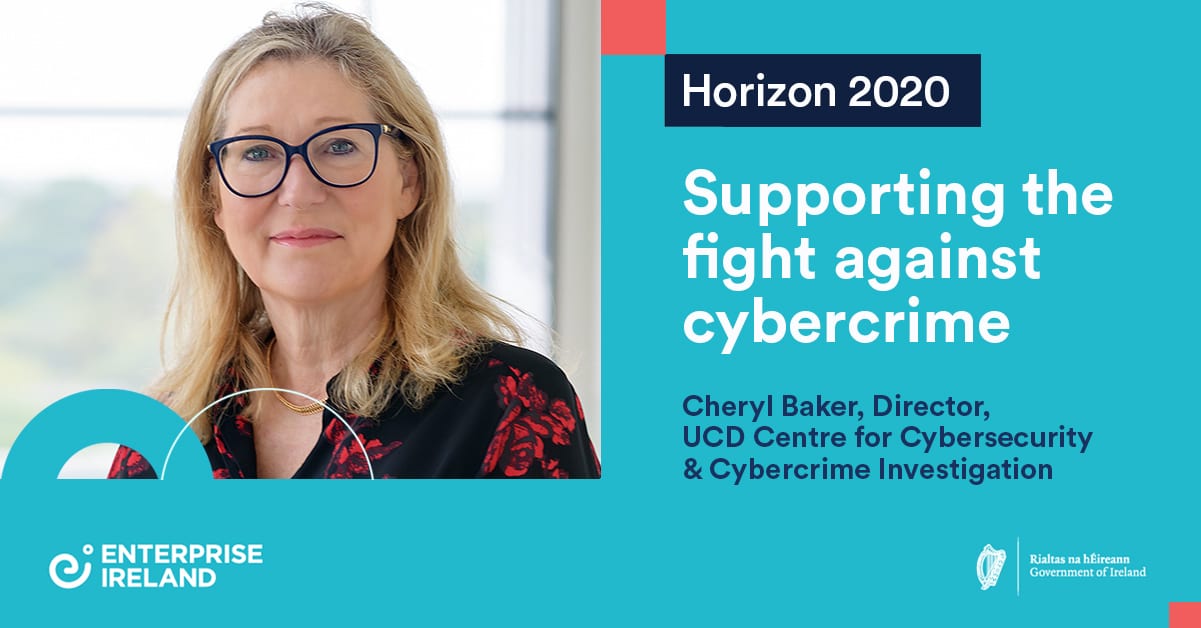“We felt we had to do this project because the problem and the solution are so important. We were just waiting for the opportunity and Horizon 2020 provided that.”
Cheryl Baker, Director, UCD Centre for Cybersecurity & Cybercrime Investigation
Overview:
- University College Dublin is leading an international consortium that is developing a shared intelligent platform and a novel process for gathering and analysing data related to cybercrime.
- The project is funded by the European Union’s Horizon 2020 research and innovation programme.
- The output will be made freely available to law enforcement agencies internationally.
Overview:
- University College Dublin is leading an international consortium that is developing a shared intelligent platform and a novel process for gathering and analysing data related to cybercrime.
- The project is funded by the European Union’s Horizon 2020 research and innovation programme.
- The output will be made freely available to law enforcement agencies internationally.
“A problem that urgently needs to be solved,” is how Cheryl Baker, Director of UCD’s Centre for Cybersecurity & Cybercrime Investigation, describes the ambitious Horizon 2020-funded project that she is leading, comprising 18 participants from across Europe.
The Intelligence Network & Secure Platform for Evidence Correlation and Transfer (INSPECTr) project aims to develop a shared intelligent platform and a novel process for gathering, analysing, prioritising and presenting key data to help in the prediction, detection and management of crime in support of multiple agencies at local, national and international level.
“The problem for law enforcement is that a huge amount of data is generated but joining the dots is difficult.” says Baker.
“There are numerous tools to help investigate cybercrime but they all have different outputs so creating links and seeing the commonality between different crimes and different investigations in different jurisdictions is really difficult. Our aim is to harmonise the output and enable the data to be better managed,” explains Baker.
The Horizon 2020 opportunity
Baker and her team have been working with law enforcement for over 10 years and have received support for various projects under the EU’s Internal Security Fund.
“When we came up with the idea for INSPECTR, we realised that to go to the next level we needed a different funding mechanism that offered more money, was more research oriented, required more partners and was more long term.”
The solution was Horizon 2020, the European Union’s research and innovation instrument, which has an €80 billion funding pot and is supporting consortia across Europe to transition great ideas from the laboratory to the market.
The three-year INSPECTr project received funding of €6.9 million and involves law enforcement agencies and commercial companies.
“Because we’ve worked with law enforcement for a number of years we were able to reach out to people that we knew already to bring them on board. When it came to commercial partners, Enterprise Ireland was really good at helping us link with a number of SMEs in Ireland,” says Baker.
Unusually for a project, the final developed platform will be freely available to all law enforcement agencies.
“The Centre for Cybersecurity & Cybercrime Investigation was set up support law enforcement in the fight against cybercrime, and everything we do we give back freely to the law enforcement community,” explains Baker.
“That did impose a bit of a challenge when it came to getting commercial partners on board, but we explained that they were going to get access to law enforcement agencies across Europe, which would give them the opportunity to develop and sell in products and services tailored to that community.”
The co-coordinator challenge
“This is our first time as co-ordinator on a Horizon 2020 project and there’s no getting round that it’s a challenge. Firstly the application process is time-consuming; close to the deadline we were working 24 hours a day,” says Baker.
“Enterprise Ireland’s help was great. Their expert knowledge and honest review of the proposal was invaluable. Their response was very positive, which gave me a lot of confidence.
“As the co-ordinator, the project fails or succeeds with you. You’re the interface with the Commission and the consortium.” explains Baker.
“For our law enforcement partners this is not their day job, so we have to provide a lot of hand-holding support to them. But we felt we understood the project better than anyone else so we wanted to lead it. If you feel strongly about your idea, it’s best to lead it.”
Horizon 2020 benefits
Baker believes that there are huge benefits for SMEs that get involved in Horizon 2020, either as a partner or a co-ordinator, but is aware that there’s a perception that the process is complicated.
“I think it’s key that SMEs partner with a co-ordinator that they know and trust, because they will show you the ropes and look after you. It’s important to make sure you’re comfortable with what you’re being asked to do and are clear about what’s expected of you. It’s a really good way to boost your revenue and to network and you can be involved in a small way and still reap lots of benefits,” she says.
“For co-ordinators, you need to ask yourself, have you really bought into your concept; do you feel that this is a problem that urgently needs to be solved? And it’s vital to understand that the administration is as important as the research so you need the supports in place for that.
“We felt we had to do this project because the problem and the solution are so important. We were just waiting for the opportunity and Horizon 2020 provided that.”
For advice or further information about applying for Horizon 2020 support please contact HorizonSupport@enterprise-ireland.com or consult www.horizoneurope.ie



